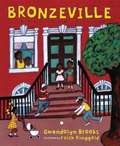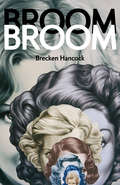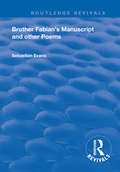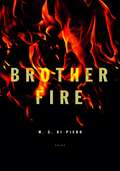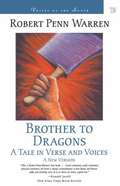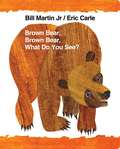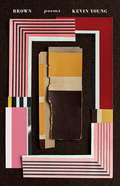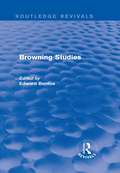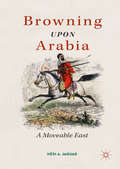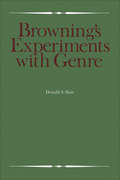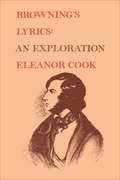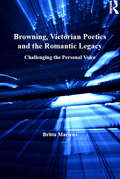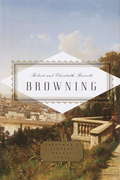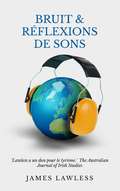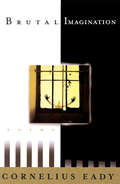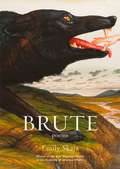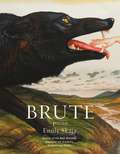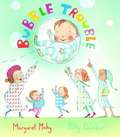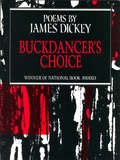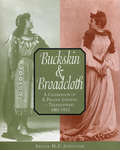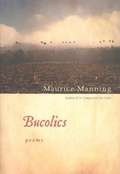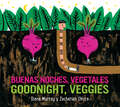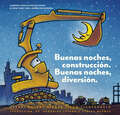- Table View
- List View
Bronzeville Boys And Girls
by Faith Ringgold Gwendolyn BrooksA collection of illustrated poems that reflects the experiences and feelings of African American children living in big cities.
Broom Broom
by Brecken HancockNothing slips by Brecken Hancock's deft ear as she seductively plumbs the depths of the evolution of bathing, doppelgangers, the Kraken, and the minutiae of family with all its tragic misgivings. The poems in Broom Broom pervert the rational, safe parts of the world to extoll and absorb the sweep of human history.What I mean to say is, the evidence is always there.From where we stand, we confuse lampposts for ghosts.Brecken Hancock's poetry, essays, interviews, and reviews have appeared in several journals, including Event and Fiddlehead. She is reviews editor for Arc Poetry Magazine.
Brother Fabian's Manuscript: And Other Poems (Routledge Revivals)
by Sebastian EvansOriginally published in 1984, Brother Fabian's Manuscript and Other Poems includes Brother Fabian's Manuscript and thirty-four additional poems.
Brother Fire: Poems
by W.S. Di PieroIn this rich collection, W. S. Di Piero seeks the spirit and substance of illumination in all its forms. He finds meaning, or shows us how we attempt to do so, in the rituals and events that mark our year-the Fourth of July, Halloween, New Year's Eve-and in the ordinary activities of mowing, dancing, drinking, trying to stay warm. "The Kiss" recounts how, as a young man, the poet was not called to the priesthood; in "Prayer Meeting," he recalls watching his mother iron, with her "hopeless routine longing," and declares, "I wanted more than what I prayed for." For all their simplicity, Di Piero's direct, often conversational turns of phrase reveal a world aflame with troubles, with love, with surprising lyrical epiphanies.Didn't You Say Desire Islike the elephant fogshredded northa white sun going downBessemers firedthrough clouds horizonedon my dog-eared stackIt feels good and rightto waste earnest hoursof an early evening'sdaylight saving timein uncertainty and wantthese cranky climateschanging in us while wehaven't started dinner yet.From the Hardcover edition.
Brother to Dragons: A Tale in Verse and Voices (Voices of the South)
by Robert Penn WarrenThe significantly revised version of Brother to Dragons appeared in 1979, twenty-six years after the original. It is, Warren wrote, “in some important senses, a new work.” Told in the distinct voices of characters long dead and now gathered at an unspecified place and time, the poem recalls events leading to and resulting from the 1811 murder of a young slave by Thomas Jefferson’s nephew. “R.P.W.” is the narrator of the versified tale, whose poignant ending brings not only reconciliation among the ghostly figures but healing for Warren’s persona as well.
Brown Bear, Brown Bear, What Do You See? (25th Anniversary Edition)
by Bill MartinA big happy frog, a plump purple cat, a handsome blue horse, and a soft yellow duck--all parade across the pages of this delightful book. <P><P>Children will immediately respond to Eric Carle's flat, boldly colored collages. <P>Combined with Bill Martin's singsong text, they create unforgettable images of these endearing animals. Images and Image descriptions available.
Brown: Poems
by Kevin YoungJames Brown. John Brown's raid. Brown v. the Topeka Board of Ed. The prize-winning author of Blue Laws meditates on all things "brown" in this powerful new collection. <p><p> Divided into "Home Recordings" and "Field Recordings," Brown speaks to the way personal experience is shaped by culture, while culture is forever affected by the personal, recalling a black Kansas boyhood to comment on our times. From "History"--a song of Kansas high-school fixture Mr. W., who gave his students "the Sixties / minus Malcolm X, or Watts, / barely a march on Washington"--to "Money Road," a sobering pilgrimage to the site of Emmett Till's lynching, the poems engage place and the past and their intertwined power. <p> These thirty-two taut poems and poetic sequences, including an oratorio based on Mississippi "barkeep, activist, waiter" Booker Wright that was performed at Carnegie Hall and the vibrant sonnet cycle "De La Soul Is Dead," about the days when hip-hop was growing up ("we were black then, not yet / African American"), remind us that blackness and brownness tell an ongoing story. A testament to Young's own--and our collective--experience, Brown offers beautiful, sustained harmonies from a poet whose wisdom deepens with time.
Browning Studies: Being Select Papers by Members of the Browning Society (Routledge Revivals)
by Edward BerdoeThis title, first published in 1909, presents a selection of the most important essays by members of the renowned Browning Society, which existed to promulgate the works of and appreciation for perhaps the greatest English poet of the Victorian Age. Browning’s poetry deals with themes that are of perennial importance: the nature of the human person, human love, and the source of the love, God. Browning Studies will appeal to Browning enthusiasts and the message his writing communicates: "A profound, passionate, living, triumphant faith in Christ, and in the immortality and ultimate redemption of every human soul in and through Christ."
Browning Upon Arabia: A Moveable East
by Hédi A. JaouadBrowning Upon Arabia charts Robert Browning’s early and enduring engagement with the East, particularly the Arab East. This book highlights the complexities of Browning’s poetry, revealing Browning’s resistance to triumphalist and imperialist forms of Orientalism generated by many nineteenth-century British and European literary and scholarly portrayals of the East. Hédi A. Jaouad argues that Browning extensively researched the literature, history, philosophy, and culture of the East to produce poetry that is sensitive to its Eastern resources and devoted to confirming the interrelation of Northern and Eastern knowledge in pursuit of a new form of transcendental humanism.
Browning's Experiments with Genre
by Donald HairOne of the chief characteristics of nineteenth-century poetics was a tendency to test the conventions and techniques of literary genres by shifting, modifying, and combining various styles and forms. Browning fully exploited these changes, because his interests and purposes as a poet seemed to demand more of the lyric, the dramatic, and the narrative than these kinds had traditionally been able to perform. His fascination was with the development of the individual soul and he was determined to evoke in his readers his own insights into the complexity of human concerns; thus he became a constant experimenter with genre. Browning never felt that any experiment, however unsatisfactory the result, was wasted effort; each direction tried made him better prepared to attempt another. This book explores the kinds and modes with which he worked and describes the nature of the experiments he made, concentrating on the earlier poetry and in particular on The Ring and the Book. Professor Hair is sensitive to Browning's work, and his criticism is a model of understanding, warm appreciation, and critical good sense.
Browning's Lyrics: An Exploration
by Eleanor CookBrowning's lyrics are favourite choices for anthologies but are rarely examined closely. This is the first full-length study of the lyrics, and includes detailed analyses of such well-known poems as Love Among the Ruins, Two in the Campagna, A Serenade at the Villa, A Toccata of Galuppi's, By the Fireside, and James Lee's Wife. Eleanor Cook explores Browning's use of repeated images and themes in the lyrics, examines these patterns in other poems and in his letters, and analyses their growth and change in all his work. She demonstrates how the lyrics may be linked with Browning's other work and shows something of his essential artistic unity. His imaginary is found to be more consistent and complex than is usually assumed.Students of Browning will find this work stimulating and instructive, while lovers of Browning will read it with pure pleasure. The reader will return to many of the poems with a rciher sense of their continuing vitality. In an earlier form this study was awarded the first A.S.P. Woodhouse Prize by the University of Toronto.
Browning, Victorian Poetics and the Romantic Legacy: Challenging the Personal Voice (Ashgate Popular And Folk Music Ser.)
by Britta MartensTaking an original approach to Robert Browning's poetics, Britta Martens focuses on a corpus of relatively neglected poems in Browning's own voice in which he reflects on his poetry, his self-conceptualization and his place in the poetic tradition. She analyzes his work in relation to Romanticism, Victorian reactions to the Romantic legacy, and wider nineteenth-century changes in poetic taste, to argue that in these poems, as in his more frequently studied dramatic monologues, Browning deploys varied dramatic methods of self-representation, often critically and ironically exposing the biases and limitations of the seemingly authoritative speaker 'Browning'. The poems thus become devices for Browning's detached evaluation of his own and of others' poetics, an evaluation never fully explicit but presented with elusive economy for the astute reader to interpret. The confrontation between the personal authorial voice and the dramatic voice in these poems provides revealing insights into the poet's highly self-conscious, conflicted and sustained engagement with the Romantic tradition and the diversely challenging reader expectations that he faces in a post-Romantic age. As the Victorian most rigorous in his rejection of Romantic self-expression, Browning is a key transitional figure between the sharply antagonistic periods of Romanticism and Modernism. He is also, as Martens persuasively demonstrates, a poet of complex contradictions and an illuminating case study for addressing the perennial issues of voice, authorial authority and self-reference.
Browning: Poems
by Robert Browning Elizabeth Barrett Browning Peter WashingtonRobert Browning and Elizabeth Barrett Browning are without parallel in the nineteenth century: celebrated poets, they became equally famous for their marriage. Still popular more than a century after their deaths, their poetry vividly reflects the unique nature of their relationship.This collection presents the Brownings' work in the context of their lives: the early years and their initial friendship, their courtship and marriage, the fifteen happy years they spent living in Italy until Elizabeth's death. Whether in short poems such as Elizabeth's "Hector in the Garden" and Robert's "Natural Magic," or in extracts from longer works such as Aurora Leigh and Pauline, the great themes they shared are all represented: love, marriage, illicit passion, England and Italy, childhood, religion, poetry, and nature. Elizabeth's famous Sonnets from the Portuguese, based on their love affair, is included in its entirety. The poems are augmented with a generous selection of the marvelous letters the Brownings wrote to each other.
Bruit & Réflexions de sons
by James Lawless Leslie PierobonWhat noise? What will happen when it gets into our heads? In Thoughts of sounds, a hilarious history marked by pathos, James Lawless sends his typical humorous way some of the effects of noise on contemporary society. This news is followed by noise, a decidedly dark poem that explores the devastation that uncontrolled cacophony can inflict on sentient beings.
Brutal Imagination PA
by Cornelius EadyBrutal Imagination is the work of a poet at the peak of his considerable powers. Its two central sections--which could be called song cycles--confront the same subject: the black man in America. The first, which carries the book's title, deals with the vision of the black man in white imagination. Narrated largely by the black kidnapper that Susan Smith invented to cover up the killing of her two sons, the cycle displays all of Mr. Eady's range: his deft wit, inventiveness, and skillfully targeted anger, and the way in which he combines the subtle with the charged, street idiom with elegant inversions, harsh images with the sweetly ordinary. The second cycle, Running Man, presents poems Mr. Eady drew on for his libretto for the music-drama of the same name, which was a l999 Pulitzer Prize finalist. Here, the focus is the black family and the barriers of color, class, and caste that tear it apart. As the Village Voice said, It is a hymn to all the sons this country has stolen from her African- American families.
Brute
by Emily SkajaSelected by Joy Harjo as the winner of the Walt Whitman Award of the Academy of American Poets'Taut, ferocious . . . This is a book about survival, and a welcome, confident debut' New York Times Book ReviewEmily Skaja's debut collection is a fiery, hypnotic book that confronts the dark questions and menacing silences around gender, sexuality and violence. Brute arises, brave and furious, from the dissolution of a relationship, showing how such endings necessitate self-discovery and reinvention. The speaker of these poems is a sorceress, a bride, a warrior, a lover, both object and agent, ricocheting among ways of knowing and being known. Each incarnation squares itself up against ideas of feminine virtue and sin, strength and vulnerability, love and rage, as it closes in on a hard-won freedom.Brute is absolutely sure of its capacity to insist not only on the truth of what it says but on the truth of its right to say it. 'What am I supposed to say: I'm free?' the first poem asks. The rest of the poems emphatically discover new ways to answer. This is a timely winner of the Walt Whitman Award, and an introduction to an unforgettable voice.
Brute: Poems
by Emily SkajaSelected by Joy Harjo as the winner of the Walt Whitman Award of the Academy of American PoetsEmily Skaja’s debut collection is a fiery, hypnotic book that confronts the dark questions and menacing silences around gender, sexuality, and violence. Brute arises, brave and furious, from the dissolution of a relationship, showing how such endings necessitate self-discovery and reinvention. The speaker of these poems is a sorceress, a bride, a warrior, a lover, both object and agent, ricocheting among ways of knowing and being known. Each incarnation squares itself up against ideas of feminine virtue and sin, strength and vulnerability, love and rage, as it closes in on a hard-won freedom. Brute is absolutely sure of its capacity to insist not only on the truth of what it says but on the truth of its right to say it. “What am I supposed to say: I’m free?” the first poem asks. The rest of the poems emphatically discover new ways to answer. This is a timely winner of the Walt Whitman Award, and an introduction to an unforgettable voice.
Bubble Trouble
by Margaret MahyLittle Mabel blew a bubble, and it caused a lot of trouble... Such a lot of bubble trouble in a bibble-bobble way. For it broke away from Mabel as it bobbled across the table, where it bobbled over Baby, and it wafted him away. When little Mabel's bubble gets away from her, it's her baby brother who gets into trouble. Soon he's floating out of the house, above the fence, and all over town! It's up to Mabel, Mother, and the rest of the townspeople to get him safely back down. Who knew that so much trouble could come from one little bubble?
Buckdancer's Choice: Poems (Wesleyan Poetry Program #Vol. 28)
by James DickeyWhoever looks to a new book by James Dickey for further work in an established mode, or for mere novelty, is going to be disappointed. But those who seek instead a true widening of the horizons of meaning, coupled with a sure-handed mastery of the craft of poetry, will find this latest collection satisfying indeed.Here is a man who matches superb gifts with a truly subtle imagination, into whose depths he is courageously traveling--pioneering--in exploratory penetrations into areas of life that are too often evaded or denied. "The Firebombing," "Slave Quarters," "The Fiend"--these poems, with the others that comprise the present volume, show a mature and original poet at his finest.<P><P> Winner of the National Book Award
Buckskin and Broadcloth: A Celebration of E. Pauline Johnson — Tekahionwake, 1861-1913
by Sheila M.F. JohnstonThis is the first generously illustrated biography of the Mohawk poet-performer E. Pauline Johnson-Tekahionwake. The author has created an exciting volume of anecdotes, letters and poetry, and illustrated it with period photographs and new illustrations by the Six Nations artist, Raymond R. Skye. While the story of Pauline Johnson has been told before, it has never been given the intimacy that this book provides. Tracing her ancestry, moving on to explore her extraordinary stage career, and finally shedding light on Pauline Johnson’s last years in Vancouver, Sheila M.F. Johnston has breathed new life into the compelling story of one of Canada’s brightest literary and stage stars. This book contains over forty poems that are not part of Pauline Johnson’s classic collection of poems, Flint and Feather. The "uncollected" poems have been culled from archives, libraries and out-of-print books. They shed light on the development of the poet, and enlighten and enrich her life story. Buckskin & Broadcloth is truly a celebration of the life of a Canadian hero – one whose legacy to Canadian literature and Canadian theatre is unparalleled.
Bucolics
by Maurice ManningUntitled and unpunctuated, the seventy poems in this acclaimed collection seem to cascade from one page to another. Maurice Manning extolls the virtues of nature and its many gifts, and finds deep gratitude for the mysterious hand that created it all.that bare branch that branch made blackby the rain the silver raindrophanging from the black branchBoss I like that black branchI like that shiny raindrop Bosstell me if I'm wrong but it makesme think you're looking rightat me now isn't that a lark for meto think you look that wayupside down like a tree frogBoss I'm not surprised at allI wouldn't doubt it fora minute you're always upto something I'll say one thingyou're all right all right you areeven when you're hanging Boss
Bucolics (in English)
by VirgilAlso known as The Ecloques, this is the first of the three major works of the Latin poet Virgil.
Buenas Noches, Vegetales/Goodnight, Veggies Bilingual
by Diana MurraySay buenas noches to adorable garden veggies in this Spanish-English bilingual book, illustrated by New York Times best-selling artist Zachariah OHora.
Buenas noches, construcción. Buenas noches, diversión. (Goodnight, Goodnight, Construc)
by Sherri Duskey Rinker¡El libro #1 de la lista New York Times bestseller ahora disponible en español!Mientras se esconde el sol detrás del sitio de construcción, todas las máquinas trabajadoras se preparan para decir buenas noches. Una por una, Grúa, Mezcladora, Volquete, Niveladora y Excavadora terminan su trabajo y se acuestan a descansar—¡alistándose para otro día de construcción y diversion! Con ilustraciones irresistibles del reconocido artista Tom Lichtenheld y simpático texto en rima, este libro emocionará a todos los niños amantes de máquinas sin importar su edad.
